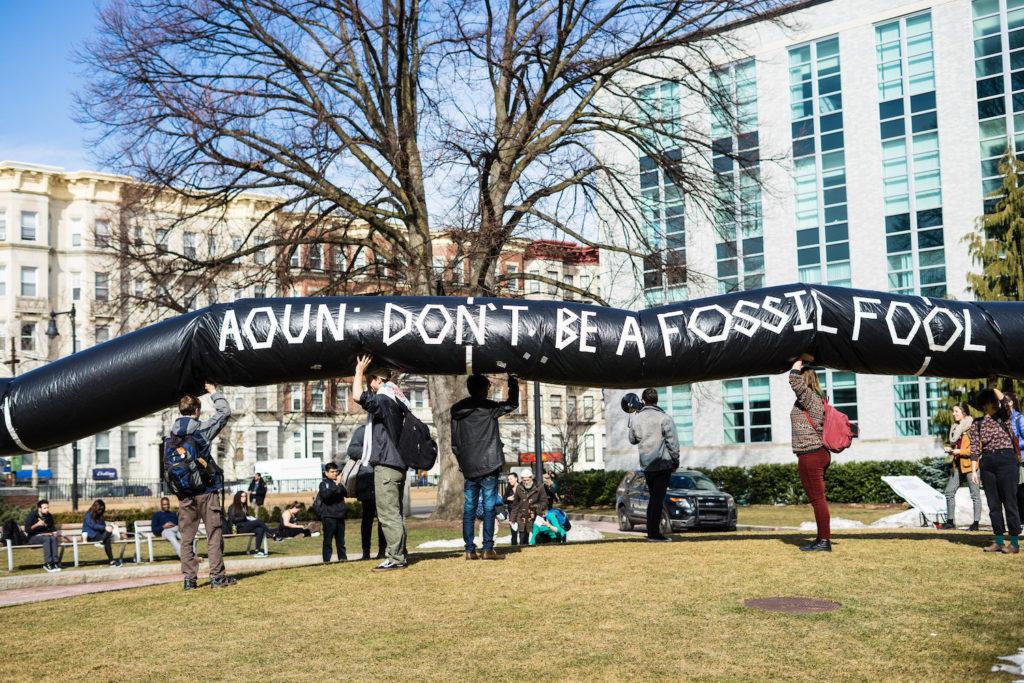DivestNU to introduce student government referendum calling on Northeastern to divest from fossil fuels
Students protest Northeastern’s investment in fossil fuel companies on Kretzman in 2017. DivestNU has been advocating for divestment for years. photo by lauren scornavacca
February 15, 2023
In March, a renewed call for Northeastern University to divest from fossil fuels will make its way onto the Student Government Association’s, or SGA’s, direct election ballot.
Echoing a similar referendum that passed in 2014, its goal is to pressure the Northeastern administration into revoking all of its current investments in fossil fuel industries, which were last estimated to total $65 million. The move comes amid a wave of recent divestment announcements among peer institutions in the Boston area, including Harvard, Boston University, the University of Massachusetts’ campus network, Wellesley College and Brandeis University.
Supporters of divestment say that the ultimate goal of the movement is to ensure companies that contribute to climate change no longer enjoy the support of major social institutions.
“There really is no future for humanity where the fossil fuel industry still exists as it currently does,” said Jonathan Bacdayan, a third-year environmental studies major and member of the Sunrise Movement, which advocates for environmental justice at Northeastern. “It’s about taking away the social license of fossil fuel companies and saying, ‘We’re not invested in your future because you’re not invested in ours.’”
In 2014, over 75% of Northeastern’s student body voted in favor of divestment in a referendum that closely resembles the one up for election next month. Despite the overwhelming victory, Northeastern did not take up divestment, choosing instead to make a $25 million investment in sustainability in 2016 while keeping its fossil fuel holdings in place.
At the time, Thomas Nedell, Northeastern’s senior vice president for finance and treasurer, justified the move.
“We have deliberately chosen to invest, not divest,” Nedell said in 2016. “This approach is consistent with Northeastern’s character as an institution that actively engages with the world, not one that retreats from global challenges.”
His stance left many supporters of divestment unsatisfied.
“Our ask was to stop supporting companies who are contributing to the climate crisis,” said Dominick Shinal, a fourth-year chemical engineering major. “Instead their solution was to keep supporting these companies, keep opening the wound and slap a band-aid on it at the same time. Investing in sustainable companies and green initiatives is a good component of it, but if you don’t wind down your involvement with the companies that are causing environmental harm, then it’s not sufficient.”
Though it won’t change Northeastern policy directly, the upcoming referendum calls for all fossil fuel holdings to be relinquished within five years, which would mark a major shift from Northeastern’s response thus far.
Students also called for Northeastern to be more upfront about the details of its financial holdings.
“What we really also want is transparency into what exactly they’re invested in,” said Anne-Claire Mousseau, a third-year psychology major. “What exactly are the sustainable investments they’ve made? What are the current fossil fuel holding amounts? Right now, we’re just going on estimates.”
A major point of contention in the debate over divestment has been the presence of Edward Galante as vice chair of Northeastern’s Board of Trustees. Galante served as the senior vice president at oil giant ExxonMobil for 30 years prior to his role at Northeastern, presenting a potential conflict of interest in his role on the body that oversees all of Northeastern’s financial holdings, including those in fossil fuels and green initiatives.
Some say that this conflict may explain why Northeastern has become an outlier among its peer institutions in its refusal to divest.
“It actually makes perfect sense,” Bacdayan said. “Because there’s a former ExxonMobil executive sitting on the Board of Trustees, so why would they be on the side of divesting from the polluter industrial complex? The people who hold power at this institution are not the students, they’re not the faculty, it’s the administration and the board of trustees, and they’re not on the same page as us and as the scientists and as the planet.”
Despite the obstacles, supporters of divestment are hopeful this year’s referendum will inspire a more forceful response than Northeastern gave to the 2014 vote. Since that time, support for divestment has been overwhelmingly reaffirmed by a 2016 resolution in the SGA and a 2021 resolution in the Northeastern Faculty Senate. This, along with the increase in peer institutions that have divested, has added to the mounting pressure on Northeastern to follow suit.
“I do expect this time to be different,” Bacdayan said. “If they want to try to play out the same playbook, those are things that won’t fly this time. This will be the second time the student body will be seriously mobilized in favor of this issue, and we hope that we’ll get a different response.
The referendum will take place during the SGA direct elections, between March 21 and 26.







